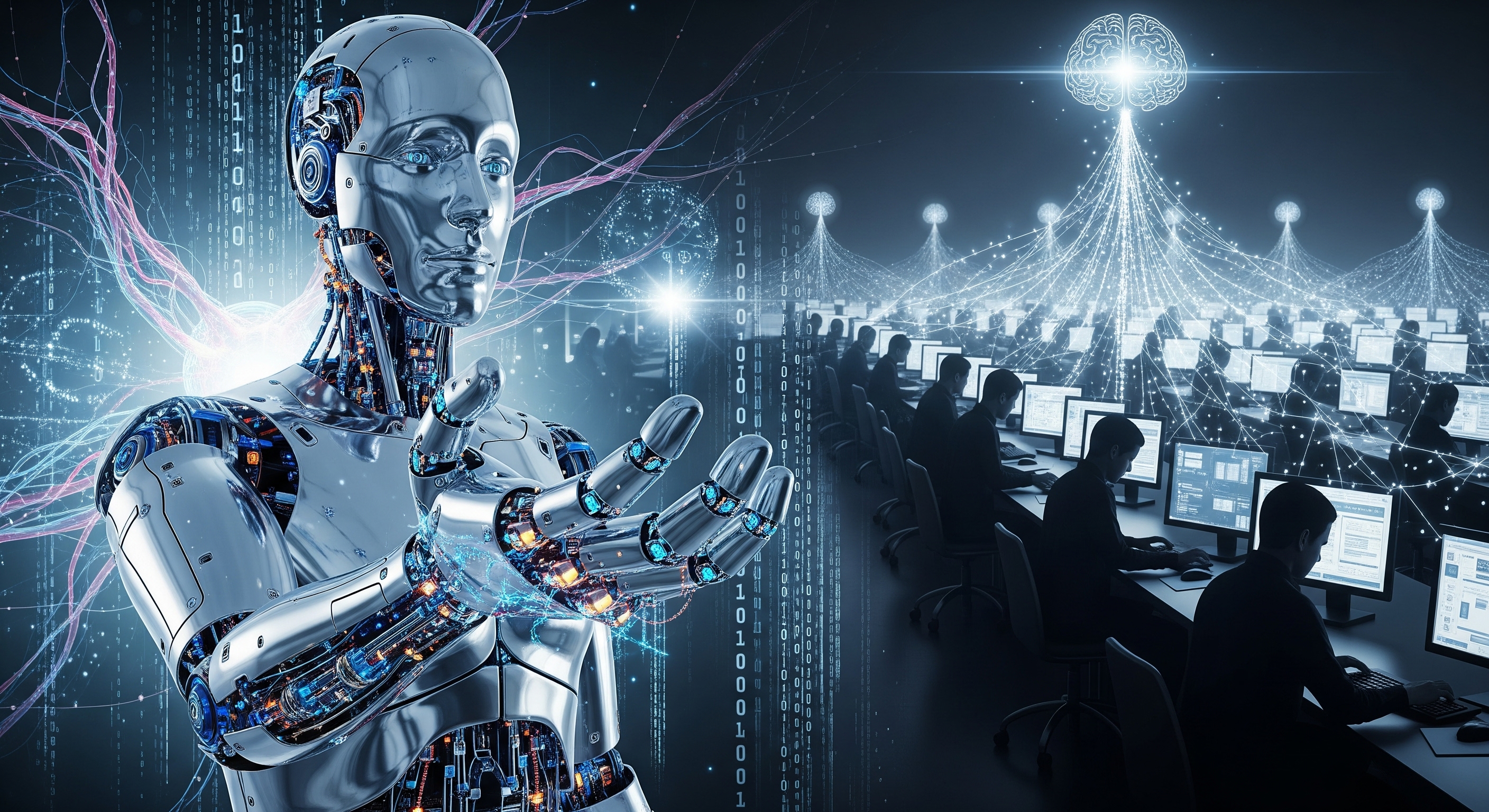The Invisible Architects: The Future of AI’s “Forgotten Workforce”

Published on
Author
Share
The Invisible Architects: Uncovering AI’s Forgotten Workforce
In the dazzling world of artificial intelligence, we often hear about incredible breakthroughs such as self-driving cars, hyper-realistic images, and chatbots that can talk about anything.
But beneath this glittering surface, there’s a massive human effort that powers every smart AI model known as the "forgotten workforce." These millions of data labelers, annotators, and content moderators are scattered across the globe, doing the meticulous work that forms the very foundation of AI. They are the human intelligence teaching machines how to see, hear, and understand the world.
Their tasks are often repetitive and demanding: they tag images with precise descriptions, transcribe nuanced audio, identify objects in videos, and filter out harmful content. This is the painstaking work that allows algorithms to learn. Yet, despite their crucial role in making AI accurate and safe, their contributions are rarely acknowledged or valued. As AI rapidly advances, what does the future hold for this essential yet often overlooked part of the global workforce?
The Double-Edged Sword of Automation
It's one of the great ironies of the AI revolution: the very intelligence these human workers help to build is becoming capable of automating their jobs. Concepts like "active learning" and "human-in-the-loop" systems are designed to minimize the need for manual labeling. AI now pre-labels huge amounts of data, leaving humans to only verify or correct the trickiest examples. While this promises faster, more efficient model development for tech companies, it raises a stark question for the people doing the work: what happens when the machines they trained no longer need them?
As AI-powered labeling tools get more sophisticated, the demand for purely manual data labelers is likely to shrink. A PwC report from 2025 indicated that "automatable jobs"—those with many tasks an AI can perform—are undergoing rapid skill changes. Entry-level, repetitive roles are particularly at risk. Many of these jobs are held by individuals in developing nations, often within the precarious gig economy. The potential for large-scale job loss could leave millions without a stable income, worsening global economic inequality.
For the annotation roles that remain, the required skills are changing fast. Future roles won't just need simple identification; they’ll demand higher-level skills like nuanced judgment, complex problem-solving, quality assurance, and a sophisticated understanding of AI ethics. This creates a significant "skill gap" for many current labelers who may not have these advanced competencies. As the World Economic Forum highlighted in 2025, continuous reskilling will be critical for this workforce to adapt.
Ethical Questions in the AI Supply Chain
Beyond the threat of automation, there are deeper ethical issues in the AI supply chain that demand our attention:
Fair Labor Practices and the Algorithmic Manager: A huge portion of data labeling happens in the gig economy, where workers are often classified as independent contractors. This means low pay, unstable work, and no benefits like health insurance or paid leave. Their work is often micro-managed not by a human boss, but by an algorithm designed to maximize efficiency and minimize costs. This can lead to intense pressure and a lack of recourse. As AI giants make immense profits from the data these workers label, shouldn’t we be ensuring fair wages, safe conditions, and robust labor protections for everyone in the supply chain?
The Psychological Toll of "Dirty Data Work": This is the truly harrowing side of data labeling. Content moderators are exposed to a constant stream of graphic, violent, or hateful content. They are the "human filters" who make our online spaces safer. These workers often lack sufficient mental health support, leading to a significant psychological toll. The mental health consequences, including PTSD, are a critical ethical blind spot that we can no longer ignore.
Data Ownership and Fair Compensation:When an individual's unique judgment and labor are used to label data, directly contributing to an AI model's commercial value, should they have any claim to the data's ownership or the profits generated by the model? This question challenges traditional intellectual property laws. While legal battles are ongoing about the use of copyrighted material to train AI, there's a largely unaddressed void concerning the intellectual labor of the annotators themselves. How do we fairly compensate those whose painstaking human effort turns raw data into invaluable training material?
Ensuring a Just AI Future for All
As AI grows exponentially, we simply can’t afford to overlook its foundational human workforce. Addressing these complex issues requires a collaborative effort from technology developers, policymakers, labor organizations, and society as a whole.
- Enhanced Transparency: AI companies must be more transparent about the working conditions, pay structures, and mental health support for data labelers throughout their supply chains.
- Fair Labor Standards: AI developers should enforce ethical sourcing guidelines that ensure fair wages, reasonable hours, and access to benefits and psychological support for all annotation workers.
- Investment in Reskilling: To soften the impact of automation, AI companies and governments must work together on robust reskilling programs. These programs could equip current labelers with the advanced skills needed for higher-value roles, such as "AI quality assurance specialists."
- Policy and Regulation: Governments need to explore new legal frameworks that address the unique labor challenges of the AI economy, defining fair compensation for data annotation and ensuring worker protections in the gig economy.
The future of AI isn't just about algorithms; it's about the people who power them. By acknowledging their vital contributions and addressing their systemic challenges, we can build an ethical and sustainable AI ecosystem that benefits everyone, not just a select few.
Bibliography:
- Gerlich, M. (2025, January 3). AI tools may weaken critical thinking skills by encouraging cognitive offloading, study suggests. PsyPost. https://www.psypost.org/ai-tools-may-weaken-critical-thinking-skills-by-encouraging-cognitive-offloading-study-suggests/
- TIME Magazine. (2025, June 23). ChatGPT May Be Eroding Critical Thinking Skills, According to a New MIT Study. TIME. https://time.com/7295195/ai-chatgpt-google-learning-school/
- Brookings Institution. (2025, July 2). What happens when AI chatbots replace real human connection. Brookings. https://www.brookings.edu/articles/what-happens-when-ai-chatbots-replace-real-human-connection/
- Psychology Today. (2025, June 3). The Psychology of AI's Impact on Human Cognition. Psychology Today. https://www.psychologytoday.com/ca/blog/harnessing-hybrid-intelligence/202506/the-psychology-of-ais-impact-on-human-cognition
- eSafety Commissioner. (2025, February 18). AI chatbots and companions – risks to children and young people. eSafety Commissioner. https://www.esafety.gov.au/newsroom/blogs/ai-chatbots-and-companions-risks-to-children-and-young-people
- PwC. (2025, June 3). The Fearless Future: 2025 Global AI Jobs Barometer. PwC Global. https://www.pwc.com/gx/en/issues/artificial-intelligence/ai-jobs-barometer.html
- World Economic Forum. (2025, April 30). Is AI closing the door on entry-level job opportunities? World Economic Forum. https://www.weforum.org/stories/2025/04/ai-jobs-international-workers-day/
- Resilience.org. (2025, June 25). “Gigification”: The Future of Work? Resilience.org. https://www.resilience.org/stories/2025-06-25/gigification-the-future-of-work/
- MLT Aikins. (2025, May 13). Copyright in the age of AI: Legal tensions and emerging cases. MLT Aikins Insights. https://www.mltaikins.com/insights/copyright-in-the-age-of-ai-legal-tensions-and-emerging-cases/
- The Employer Report. (2025, June 20). Navigating Labor's Response to AI: Proactive Strategies for Multinational Employers Across the Atlantic. The Employer Report. https://www.theemployerreport.com/2025/06/navigating-labors-response-to-ai-proactive-strategies-for-multinational-employers-across-the-atlantic/

Eric Hutt

.jpg)

